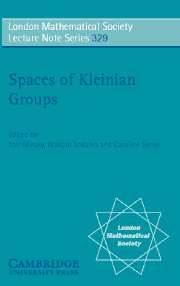Book contents
- Frontmatter
- Contents
- Preface
- Drilling short geodesics in hyperbolic 3-manifolds
- On topologically tame Kleinian groups with bounded geometry
- An extension of the Masur domain
- Thurston's bending measure conjecture for once punctured torus groups
- Complexity of 3-manifolds
- Moduli of continuity of Cannon–Thurston maps
- Variations of McShane's identity for punctured surface groups
- Train tracks and the Gromov boundary of the complex of curves
- The pants complex has only one end
- The Weil–Petersson geometry of the five-times punctured sphere
- Convexity of geodesic-length functions: a reprise
- A proof of the Ahlfors finiteness theorem
- On the automorphic functions for Fuchsian groups of genus two
- Boundaries for two-parabolic Schottky groups
- Searching for the cusp
- Circle packings on surfaces with projective structures: a survey
- Grafting and components of quasi-fuchsian projective structures
- Computer experiments on the discreteness locus in projective structures
Complexity of 3-manifolds
Published online by Cambridge University Press: 05 November 2011
- Frontmatter
- Contents
- Preface
- Drilling short geodesics in hyperbolic 3-manifolds
- On topologically tame Kleinian groups with bounded geometry
- An extension of the Masur domain
- Thurston's bending measure conjecture for once punctured torus groups
- Complexity of 3-manifolds
- Moduli of continuity of Cannon–Thurston maps
- Variations of McShane's identity for punctured surface groups
- Train tracks and the Gromov boundary of the complex of curves
- The pants complex has only one end
- The Weil–Petersson geometry of the five-times punctured sphere
- Convexity of geodesic-length functions: a reprise
- A proof of the Ahlfors finiteness theorem
- On the automorphic functions for Fuchsian groups of genus two
- Boundaries for two-parabolic Schottky groups
- Searching for the cusp
- Circle packings on surfaces with projective structures: a survey
- Grafting and components of quasi-fuchsian projective structures
- Computer experiments on the discreteness locus in projective structures
Summary
Abstract
We give a summary of known results on Matveev's complexity of compact 3-manifolds. The only relevant new result is the classification of all closed orientable irreducible 3-manifolds of complexity 10.
Introduction
In 3-dimensional topology, various quantities are defined, that measure how complicated a compact 3-manifold M is. Among them, we find the Heegaard genus, the minimum number of tetrahedra in a triangulation, and Gromov's norm (which equals the volume when M is hyperbolic). Both Heegaard genus and Gromov norm are additive on connected sums, and behave well with respect to other common cut-and-paste operations, but it is hard to classify all manifolds with a given genus or norm. On the other hand, triangulations with n tetrahedra are more suitable for computational purposes, since they are finite in number and can be easily listed using a computer, but the minimum number of tetrahedra is a quantity which does not behave well with any cut-and-paste operation on 3-manifolds. (Moreover, it is not clear what is meant by “triangulation”: do the tetrahedra need to be embedded? Are ideal vertices admitted when M has boundary?)
In 1988, Matveev introduced [Mat88] for any compact 3-manifold M a non-negative integer c(M), which he called the complexity of M, defined as the minimum number of vertices of a simple spine of M. The function c is finite-to-one on the most interesting sets of compact 3-manifolds, and it behaves well with respect to the most important cut-and-paste operations.
- Type
- Chapter
- Information
- Spaces of Kleinian Groups , pp. 91 - 120Publisher: Cambridge University PressPrint publication year: 2006
- 10
- Cited by

